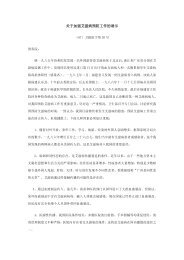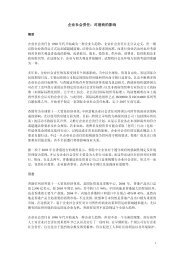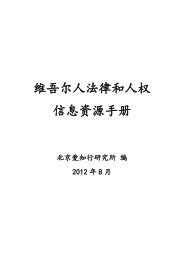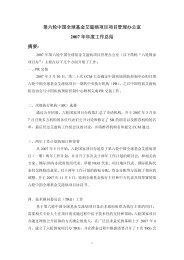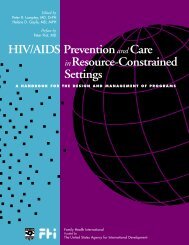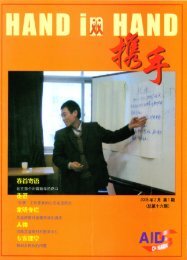The Training of Trainers Manual - UNFPA
The Training of Trainers Manual - UNFPA
The Training of Trainers Manual - UNFPA
You also want an ePaper? Increase the reach of your titles
YUMPU automatically turns print PDFs into web optimized ePapers that Google loves.
Closure<br />
Explain that no matter what recruitment strategy is used, programmes should seek<br />
to represent their target audience and choose recruits based on the objectives <strong>of</strong><br />
a project. This <strong>of</strong>ten means selecting a balance in gender, vulnerability, and age.<br />
Emphasize that making recruits and selected individuals aware from the beginning<br />
<strong>of</strong> what is expected will help to decrease turnover or dropping out. Finally, they<br />
should look for people who are charismatic facilitators, organized workers, modest<br />
observers, and sensitive communicators.<br />
<strong>Training</strong> note<br />
Building and retaining a peer educator team<br />
After recruiting and training a team <strong>of</strong> peer educators, it is useful to develop a contract<br />
<strong>of</strong> expectations with them. <strong>The</strong> contract should be a result <strong>of</strong> collaboration with peer<br />
educators, trainers, and program staff. This contract acts as guidelines to help peer<br />
educators understand their roles. It also establishes clear responsibilities from the<br />
beginning and a timeline <strong>of</strong> commitment.<br />
Ask the team to agree to abide by the contract and sign it. <strong>The</strong> contract should include:<br />
▼ Guidelines about attendance, punctuality, and following established<br />
ground rules.<br />
▼ Notification if team members know they will be absent (for example, if they have<br />
a doctor’s appointment). Participants should understand that if they miss some<br />
training sessions, they are responsible for gathering the relevant information that<br />
they have missed. Explain that excessive absences or tardiness might be grounds<br />
for reassessing suitability for the team and that participants will be given warnings<br />
if their continued participation is in question.<br />
All team members should have certain basic skills, although some might be specialists<br />
with a particular talent in a given area. Experience shows that many peer education<br />
groups naturally fall into a pattern in which they tend to rely on the same people to<br />
do the same things. For example, the group may begin to rely too much on one or two<br />
<strong>of</strong> the educators to provide scientific or medical information. If the group’s ‘experts’<br />
are suddenly unavailable for a training session, the others may feel incompetent or<br />
unqualified to present the relevant teaching unit.<br />
102 <strong>Training</strong> <strong>of</strong> <strong>Trainers</strong> <strong>Manual</strong>



